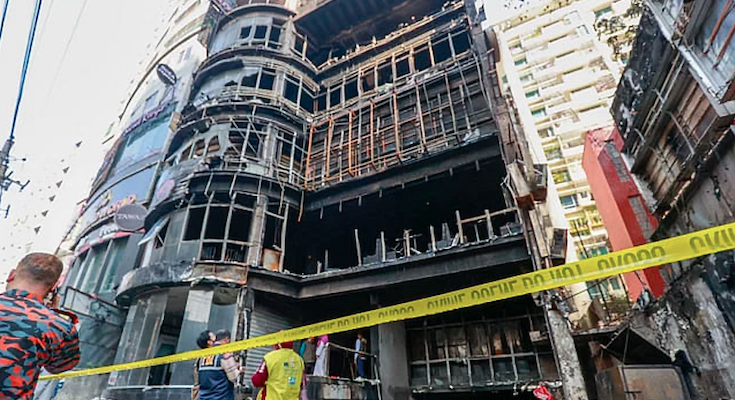Bailey Road tragedy spurs RAJUK and City Corporation into action
Yeasir Arafat
Publish: 07 Mar 2024, 02:59 PM

Previously dormant, the Capital Development Authority and the Dhaka South City Corporation have suddenly sprung into action with remarkable vigour. Following a tragic fire in Bailey Road that claimed the lives of 46 individuals, both organisations swiftly responded. On Monday, March 4, RAJUK initiated a surprise raid on the Gausia Twin Peak building on Satmasjid Road in Dhanmondi, in the capital. Led by the organisation's magistrate, the raid resulted in sealing 12 restaurants and demolishing the rooftop retro live kitchen. RAJUK stated that these restaurants were operating without proper permission. In addition, the Dhaka South City Corporation raided the Dhanmondi Carey Crescent building, sealing off several restaurants.
The presence of illegal buildings in the capital is unsurprising, with numerous structures lacking approval from RAJUK, and many owners constructing them in ways that deviate from approved plans. Allegations of design infringement are widespread.
The restaurant industry in the country has experienced significant growth in recent years, particularly in the capital, Dhaka, where eateries are ubiquitous. However, there is a lack of rules and regulations, necessary approvals, and safety measures. Many floors of high-rise buildings have been converted into kitchens, with cooking primarily reliant on cylinders due to the absence of gas connections.
In the evenings, numerous food enthusiasts from the city flock to various restaurants enticed by a wide array of culinary delights. Alongside local dishes, mouth watering cuisines from multiple Asian countries and recipes from Europe and North and South America draw many patrons to these establishments. Additionally, these restaurants often host events organised by various organisations, contributing to their bustling atmosphere.
Following the tragic fire incident on Bailey Road, speculation arose that a rigorous crackdown on restaurants might ensue, and indeed, it materialised. In a single day, authorities shuttered 12 restaurants within one building. Notably, establishments within the buildings were not spared from closure; many restaurants witnessed the destruction of their interior decorations through vigorous hammering and dismantling.
The recent swift actions taken by RAJUK and the Dhaka City Corporation have sparked numerous questions among the public. With countless hotels and restaurants situated in the heart of the capital, the failure to enforce regulations over time reflects poorly on RAJUK's responsibilities. Addressing this issue challenges the city corporation to prevent such lapses.
The pattern of conducting raids solely in response to significant incidents or accidents extends beyond the realm of restaurants. In recent days, hospitals, clinics, and diagnostic centres have become the focus of similar operations, prompted by cases of wrongful treatment resulting in fatalities. The health department has taken decisive measures, including shutting down several hospitals and imposing fines on others.
Past instances, such as the operation conducted in the Gulshan area following the tragic shooting at Holy Artisan, where 24 lives were lost, demonstrate a recurring cycle. However, these actions often seem temporary, with the situation reverting to its previous state after a brief period. Authorities often appear to turn a blind eye, allowing those with political influence or financial power to flout regulations with impunity.
This prevailing trend underscores a systemic issue where individuals involved in hotels, restaurants, or healthcare facilities either wield significant political clout or engage in bribery to evade accountability. The recent actions by RAJUK and the city corporation may be perceived as mere facades aimed at diverting attention from the underlying problems. Bangladesh appears to be moving further away from the governance structure necessary to address these issues effectively rather than making progress towards it.
